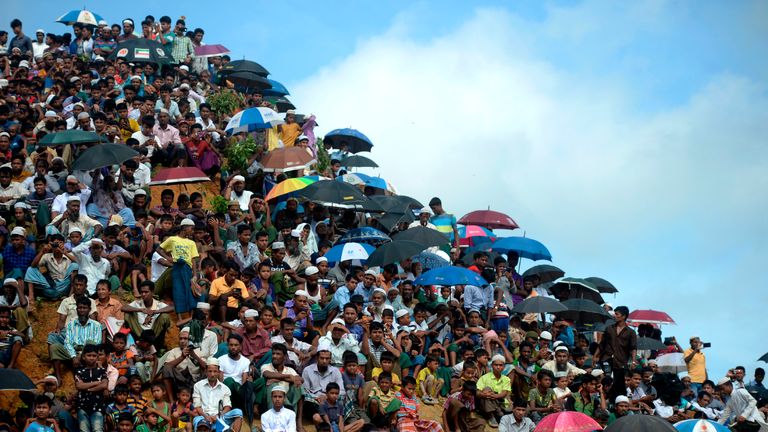Rohingya crisis: UN chief warns refugees must be repatriated to Myanmar safely
Hundreds of thousands of Rohingya Muslims fled Myanmar in 2017, after security forces began a campaign of murder in the area.
Sunday 3 November 2019 17:44, UK
The head of the UN has called on Myanmar to take responsibility for hundreds of thousands of Rohingya Muslim refugees and work towards their safe return to the country from Bangladesh.
A wave of refugees began fleeing Myanmar in late August after its response to an attack by Rohingya militants on more than 20 police posts that the government said left 12 members of the security forces dead.
Amnesty International said security forces then went on to carry out a "targeted campaign of widespread and systematic murder, rape and burning", which has been described by some as widespread ethnic cleansing.
More than 600,000 people fled the violence, bringing the total number of Rohingya refugees in Bangladesh to around 900,000.
UN Secretary-General Antonio Guterres was speaking at a meeting of the Association of Southeast Asian Nations (ASEAN), and said Myanmar should deal with the root causes of why so many Rohingya people fled the country.
Mr Guterres said that he is "deeply concerned about the situation in Myanmar, including Rakhine [where the refugees have fled from] state, and the plight of the massive number of refugees still living increasingly in difficult conditions".
He added: "It remains, of course, Myanmar's responsibility to address the root causes and ensure a conducive environment for the safe, voluntary, dignified and sustainable repatriation of refugees to Rakhine state, in accordance with international norms and standards."
The secretary-general also said that Myanmar should make an attempt "to facilitate dialogue with refugees and pursue confidence building measures" and "to ensure humanitarian actors have full and unfettered access to areas of return, as well as communities in need".
ASEAN, the group of nations which Mr Guterres was speaking, to have a policy of non-interference in each other's home affairs, however Malaysia and Indonesia, which both have majority Muslim populations, have been pushing for the group to have a more active involvement in the crisis, in order to ensure the refugees receive better treatment.
However, the group does help with the delivery of humanitarian aid.
In a statement, the group failed to acknowledge the issues that could occur with the sudden influx of hundreds of thousands of people on Bangladesh, but did agree with Mr Guterres by saying there were already repatriation agreements in place.
It added that there is "the need to find a comprehensive and durable solution to address the root causes of the conflict and to create a conducive environment so that the affected communities can rebuild their lives."
:: Listen to the Behind the Headlines podcast on , , ,
The group also added that it expects an investigation commissioned by Myanmar's government to be carried out, but questions have been raised by the UN into how fair the findings will be, noting that some of the members of the commission are considered to be biased in favour of the Myanmar military.
A formal agreement between Bangladesh and Myanmar to repatriate the Rohingya people does exist, however as yet, no refugees have officially returned to their homes, over fears for their safety.





